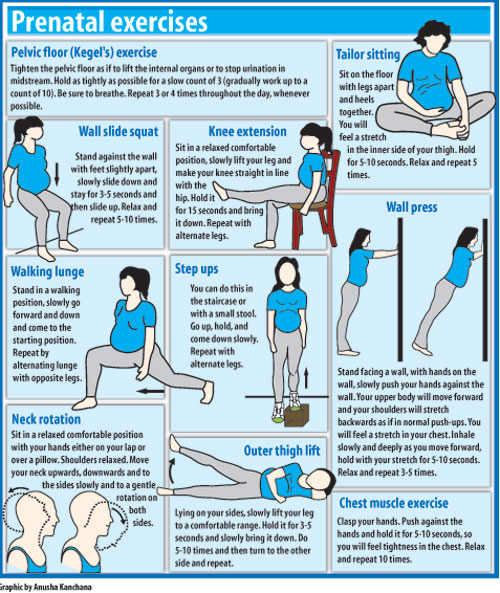For all that it is a joyous time, pregnancy itself is not the most comfortable of conditions. However, the right exercises can reduce the discomfort associated with the physical changes in your body, says Gopi Kitnasamy, Chartered Physiotherapist at Durdans Hospital. Making exercise a habit will not only ease your labour and delivery but will also contribute to your baby's wellbeing.
Most mothers-to-be will put on a few additional kgs through these nine months and these exercises will help ensure that you don't gain unnecessary weight or body fat. Even after you deliver, you will continue to feel the benefits, promises Mr. Kitnasamy, explaining that the exercises help you bounce back to your normal weight and activity levels. In general, you will find that the physical activity "improves your mental and emotional health, reduces stress and improves concentration," says Mr. Kitnasamy.
General guidelines:
- Exercise regularly.
- Avoid exercising on your back after 1st trimester
- Stop all contact sports
- Listen to your body and regulate the level and duration of the exercise.
- During pregnancy, it is especially important not to overwork. (One sign of overworking is shortness of breath.)
- Avoid exercise that requires careful balance
- Avoid extreme movements
- Stop if you feel pain
- Finish eating at least 1 to 1 1/2 hours before working out
- Drink water before, during, and after your work-out - even if you aren't thirsty.
- Don't go on a calorie-restricted diet during pregnancy. Eat a nutritious, balanced diet.
Prenatal exercise safety
It is essential that you consult your physician before you attempt any exercise programme, especially if you have a cardiac (heart) or respiratory condition, diabetes that developed before or during pregnancy, high blood pressure, a history of premature labour, placenta problems or a musculoskeletal disorder. Exercising under such conditions may put you and your baby at serious risk.
The safest and most productive activities during pregnancy (especially for the woman exercising for the first time) are swimming and walking.
Your body is your best guide and usually responds with pain or fatigue if an activity becomes inappropriate. Pay attention to these signals. Be especially aware of your lower back, hip joints, and pelvis - they are your most vulnerable areas.
If at any time during exercise you feel extremely fatigued, faint, dizzy, lightheaded, nauseated, or clammy and cold even though you are sweating, stop exercising, but walk around for a while and then sit down. Stop exercising immediately if you have any bleeding or cramping.
Contact your doctor if there is:
- Swelling of face and hands
- Severe headaches
- Persistent dizziness
- Chest pain or palpitations
- Difficulty in walking because of pain
- Vaginal bleeding
- Excessive discharge
- Fever
|

